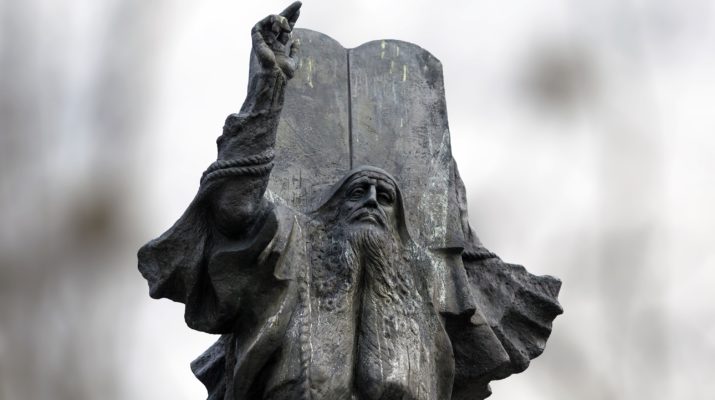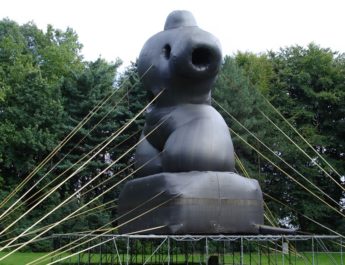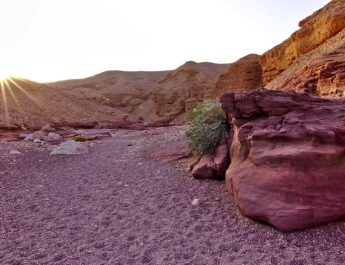Exodus 32:1-14
Proper 23A
BibleHub
1 When the peopleI sawII that MosesIII delayedIV to come downV from the mountain,VI
Notes on verse 1a
I “people” = am. From amam (to darken, hide, associate; creating shadows by huddling together). This is people or nation. It can be used specifically for a tribe, collectively of troops or armies, or figuratively to refer to a flock of animals.
II “saw” = raah. This is to see in a literal or figurative sense so stare, advise, think, view.
III “Moses” = Mosheh. From mashah (to pull out in a literal or figurative sense, to draw out) OR from Egyptian mes or mesu (child, son i.e. child of…). This is Moses – the one drawn out from the water, which is to say, rescued. If derived from the Egyptian, his name would share a root with Rameses and Thutmose.
IV “delayed” = bosh. Properly, this means to be pale, which implies shame, disappointment, or confusion.
V “come down” = yarad. This is to go down, descend; going down in a literal or figurative sense. It can be going to the shore or a boundary, bringing down an enemy.
VI “mountain” = har. From harar (hill or mountain). This is mountain, hill, hilly region.
the people gatheredVII around AaronVIII and said to him, “Come,IX makeX godsXI for us,
Notes on verse 1b
VII “gathered” = qahal. From qahal (assembly, congregation, multitude). This is to gather, convene, assemble like a congregation.
VIII “Aaron” = Aharon. Derivation uncertain. May mean “bearer of martyrs” OR be related to Ancient Egyptian ꜥḥꜣ rw (warrior lion) OR elevated, exalted, high mountain. This is Aaron. See https://en.wiktionary.org/wiki/Aaron
IX “come” = qum. To arise, stand, accomplish, establish, abide. This is rising as in rising against, getting up after being sick or asleep, arising from one state to another, becoming powerful, or rising for action. It can also be standing in a figurative sense.
X “make” = asah. This is to make, do, act, appoint, become in many senses.
XI “gods” = elohim.
who shall goXII beforeXIII us; as for this Moses, the manXIV who brought us upXV
Notes on verse 1c
XII “go” = halak. This is go, come, walk. It is walk literally and figuratively and includes people and animals. It can be used figuratively for one’s moral life – how we walk according to God’s way or against it. It can also refer to the walk of life as in the course one’s life takes, the choices we make, etc.
XIII “before” = paneh. From panah (to turn, face, appear). This is face in a literal or figurative sense. It could be face, presence, anger, respect. It can also be used of God to indicate divine favor or presence.
XIV “man” = ish. Perhaps from enosh (human, humankind, mortal); from anash (to be weak, sick, or frail). This is man, husband, another, or humankind.
XV “brought…up” = alah. This is to go up, approach, ascend, be high, be a priority; to arise in a literal or figurative sense.
out of the landXVI of Egypt,XVII we do not knowXVIII what has becomeXIX of him.”
Notes on verse 1d
XVI “land” = erets. Root may mean to be firm. This is earth, ground, field land, or country.
XVII “Egypt” = Mitsrayim. Perhaps from matsor (besieged or fortified place, bulwark, entrenchment; something hemmed in; a siege or distress or fastness); from tsur (to confine, besiege, to cramp). This is Egypt.
XVIII “know” = yada. This is to know, acknowledge, advise, answer, be aware, be acquainted with. Properly, this is to figure something out by seeing. It includes ideas of observation, recognition, and care about something. It can be used causatively for instruction, designation, and punishment.
XIX “become” = hayah. This is to be or become, to happen.
2 Aaron said to them, “Take offXX the goldXXI ringsXXII that are on the earsXXIII of your wives,XXIV your sons,XXV and your daughtersXXVI and bringXXVII them to me.”
Notes on verse 2
XX “take off” = paraq. 10x in OT. This is to tear apart, break off, drag away, or crunch. Figuratively, it can mean to deliver.
XXI “gold” = zahab. Root may mean to shimmer. This is gold or something that has the color of gold like oil. It can also refer to a clear sky – to good weather.
XXII “rings” = nezem. 17x in OT. This is a ring worn for decorative reasons. It also includes earrings, nose rings, or other jewels.
XXIII “ears” = ozen. This is ear, hearing, audience, show. Properly, it is broadness – applied to its ear in reference to its shape.
XXIV “wives” = ishshah. Related to “man” in v1. From ish (see note XIV above). This is woman, wife, or female.
XXV “sons” = ben. From banah (to build or obtain children). This is son, age, child. It is son in a literal or figurative sense.
XXVI “daughters” = bat. Related to “sons” in v2. From ben (see note XXV above). This is daughter in a literal or figurative sense.
XXVII “bring” = bo. This is to enter, come in, advance, fulfill, bring offerings, enter to worship, attack. It can also have a sexual connotation.
3 So allXXVIII the people took off the gold rings from their ears and brought them to Aaron. 4 He tookXXIX these from them,XXX formedXXXI them in a mold,XXXII
Notes on verses 3-4a
XXVIII “all” = kol. From kalal (to complete). This is all or every.
XXIX “took” = laqach. This is to take, accept, carry away, receive. It can also have the sense of take a wife or take in marriage.
XXX “them” = yad. This is hand, ability, power. Hand in a literal sense, but also what one can do or the means by which one does it.
XXXI “formed” = yatsar. Perhaps related to yatsar (to be narrow, distressed, or vexed); perhaps related to tsarar (to bind, restrict, narrow, be cramped, an adversary). This is to fashion or form, perhaps by squeezing something into a shape or form. Particularly, it is to create as a potter does. Figuratively, it is to determine.
XXXII “mold” = cheret. 2x in OT. Perhaps more literally “formed it with a chisel.” This is any kind of tool used for engraving – a stylus, chisel, or pen.
and castXXXIII an imageXXXIV of a calf,XXXV and they said, “These are your gods, O Israel,XXXVI who brought you up out of the land of Egypt!”
Notes on verse 4b
XXXIII “cast” = asah. Same as “make” in v1. See note X above.
XXXIV “image” = massekah. From nasak (to cover, pour out, offer; by analogy anointing a king). This is a pouring out or over. So it could be pouring molten metal to cast an image, making a libation (pouring out a drink offering), or otherwise covering.
XXXV “calf” = egel. May be from the same as agol (round, circular – root meaning revolve). This is a male calf as one that frisks about. Often used for one that is almost grown up. This is also the word used for the molten calf in Ex 32.
XXXVI “Israel” = Yisrael. Related to “gods” in v1. From sarah (to persist, exert oneself, contend, persevere, wrestle, prevail) + el (see note XI above). This is Israel, meaning God strives or one who strives with God; new name for Jacob and for his offspring. This refers to the people and to the land.
5 When Aaron saw this, he builtXXXVII an altarXXXVIII beforeXXXIX it, and Aaron made a proclamationXL
Notes on verse 5a
XXXVII “built” = banah. Perhaps related to “sons” and “daughters” in v2. See note XXV above.
XXXVIII “altar” = mizbeach. From zabach (to kill, slay, offer; slaughtering an animal to offer as a sacrifice). This is an altar.
XXXIX “before” = paneh. Same as “before” in v1. See note XIII above.
XL “made a proclamation” = qara. This is to call or call out – to call someone by name. Also used more broadly for calling forth.
and said, “TomorrowXLI shall be a festivalXLII to the Lord.”XLIII
Notes on verse 5b
XLI “tomorrow” = machar. Perhaps from achar (to be behind, delay, be late, procrastinate, continue). This is tomorrow or later. It is some kind of deferred time, so it could also mean indefinitely or refer to the time to come.
XLII “festival” = chag. From chagag (feast, celebrating a festival, making a pilgrimage; properly, going in a circle or marching in sacred procession; implies giddiness and dancing; reeling to and fro). This is a feast, a sacrifice as part of a festival, or the gathering of the festival.
XLIII “Lord” = YHVH. Related to “become” in v1. From havah (to be, become) or hayah (see note XIX above). This is the name of the God of Israel, the self-existent and eternal one, the tetragrammaton. This pronunciation has been lost to time so “Lord” is generally used in its place.
6 They rose earlyXLIV the next dayXLV and offeredXLVI burnt offeringsXLVII
Notes on verse 6a
XLIV “rose early” = shakam. This is leaning one’s shoulder into a burden or load, whether a person or an animal. Thus, it meant starting or rising early.
XLV “next day” = mochorath. Related to “tomorrow” in v5. From the same as machar (see note XLI above). This is the next day or next morning.
XLVI “offered” = alah. Same as “brought…up” in v1. See note XV above.
XLVII “burnt offerings” = olah. Related to “brought…up” in v1. From alah (see note XV above). This is a step, stairs, or some kind of ascent. It is also used for whole burnt offerings, being the offering in which the whole things is burned and rises as smoke. Burnt offerings were the least common of the offerings: most were eaten, shared with the priest and the one bringing the offering.
and broughtXLVIII sacrifices of well-being,XLIX and the people sat downL
Notes on verse 6b
XLVIII “brought” = nagash. This is to draw, bring, or come near. It is approaching for any reason – as an attack on an enemy, in order to worship, to make an argument. It can also be used as a euphemism for sex.
XLIX “sacrifices of well-being” = shelem. From shalam (to make amends, finish, be safe, be friendly, to be complete or sound). This is a peace offering or a sacrifice of well-being. It was a voluntary offering given when one celebrated thanksgiving, alliance, or friendship.
L “sat down” = yashab. This is to sit and so to remain and so to dwell. It is sitting for any reason – as a judge, in order to ambush, or just sitting quietly. Causatively, this can mean settling or marrying. This can also mean continue, endure, or establish.
to eatLI and drinkLII and rose upLIII to revel.LIV
Notes on verse 6c
LI “eat” = akal. This is to eat, devour, burn up, or otherwise consume. It can be eating in a literal or figurative sense.
LII “drink” = shathah. This is to drink literally or figuratively. It could also be a drinker.
LIII “rose up” = qum. Same as “come” in v1. See note IX above.
LIV “revel” = tsachaq. 13x in OT. This is to laugh, mock, play, make sport. It is laughing out loud whether in joy or in a scornful way. This is the root of “Isaac.”
7 The Lord saidLV to Moses, “Go downLVI at once! Your people, whom you brought up out of the land of Egypt, have acted perversely;LVII 8 they have been quickLVIII to turn asideLIX
Notes on verses 7-8a
LV “said” = dabar. This is generally to speak, answer, declare, or command. It might mean to arrange and so to speak in a figurative sense as arranging words.
LVI “down” = yarad. Same as “come down” in v1. See note V above.
LVII “acted perversely” = shachath. This is to go to ruin, perish, decay, batter, cast off, lose, one who destroys. This can be used in a literal or figurative sense.
LVIII “quick” = maher. 18x in OT. From mahar (being liquid, which implies flowing; so, hurrying forward, whether in a positive or negative sense). This is speedy, quickly, soon, suddenly, or at once.
LIX “turn aside” = sur. This is to turn aside in a literal or figurative sense – to depart, decline, rebel, remove, or withdraw.
from the wayLX that I commandedLXI them; they have cast for themselves an image of a calf and have worshipedLXII it and sacrificedLXIII to it and said, ‘These are your gods, O Israel, who brought you up out of the land of Egypt!’”
Notes on verse 8b
LX “way” = derek. From darak (to tread, march, to walk. Can also mean affixing a string to a box since one needs to step on it to bend it in the process; so also an archer). This is a road as a thing that is walked on. Can be used figuratively for the path that one’s life takes or how one chooses to live one’s life.
LXI “commanded” = tsavah. This is to charge, command, order, appoint, or enjoin. This is the root that the Hebrew word for “commandment” comes from (mitsvah).
LXII “worshiped” = shachah. This is to bow down, make a humble entreaty, to do homage to royalty or to God.
LXIII “sacrificed” = zabach. Related to “altar” in v5. See note XXXVIII above.
9 The Lord said to Moses, “I have seen this people,LXIV how stiffLXV-neckedLXVI they are. 10 Now let me aloneLXVII so that my wrathLXVIII
Notes on verses 9-10a
LXIV {untranslated} = hinneh. From hen (lo! Behold! If, though; an expression of surprise). This is to draw attention, show suddenness or surprise, or to emphasize the importance of the coming statement. See! Lo! Behold!
LXV “stiff” = qasheh. From qashah (to be fierce, cruel, dense, tough, severe). This is hard, severe, heavy, obstinate, hard-hearted.
LXVI “necked” = oreph. This is the back of the neck – also used for stiff-necked. It is also used for the back more generally in a literal or figurative sense.
LXVII “let…alone” = yanach. Perhaps from the same as nuach (to rest, calm, camp, free, place, remain, satisfy, settle, station, or wait; implies settling down in a literal or figurative sense). This is to lay down, let alone, pacify, cast down, or deposit. It can also mean to allow something or someone to stay.
LXVIII “wrath” = aph. From anaph (to be angry; properly, breathing hard as a signifier of being enraged). This properly refers to the nose or nostril and by extension the face. It can specifically refer to anger or wrath as one breathes hard and nostrils flare in times of great anger.
may burn hotLXIX against them and I may consumeLXX them, and of you I will make a greatLXXI nation.”LXXII
Notes on verse 10b
LXIX “burn hot” = charah. Perhaps related to charar (to be hot, burn, glow, melt, be scorched; figuratively, to incite passion, be angry). This is to be displeased, burn with anger, glow, become warn. Figuratively it is a blaze of anger, zeal, or jealousy.
LXX “consume” = kalah. This is to end, be finished, complete, prepare, consume, spent, or completely destroyed.
LXXI “great” = gadol. From gadal (to grow up, become great, become wealthy – to advance. The root meaning may be to twist in the sense of the process of growing). This is great, high, bigger, noble, old, marvelous. It can also refer to someone who is powerful or distinguished.
LXXII “nation” = goy. From the same root as gevah (the back, person, or body); related to gev (among); related to gaah (to rise up). This is nation or people. Often used to refer to Gentiles or foreign nations. It can also be used figuratively for a group of animals. This is where the Yiddish “goy” comes from.
11 But Moses imploredLXXIII theLXXIV Lord his GodLXXV and said, “O Lord, why does your wrath burn hot against your people, whom you broughtLXXVI out of the land of Egypt with great powerLXXVII and with a mightyLXXVIII hand?LXXIX
Notes on verse 11
LXXIII “implored” = chalah. Properly, this is to be worn; hence, being weak, sick, or afflicted. It can also mean to grieve or, positively, to flatter or entreat.
LXXIV {untranslated} = paneh. Same as “before” in v1. See note XIII above.
LXXV “God” = Elohim. Same as “gods” in v1. See note XI above.
LXXVI “brought” = yatsa. This is to go or come out, bring forth, appear. It is to go out in a literal or figurative sense.
LXXVII “power” = koach. Root may mean to be firm. This is power, strength, force. It can be literal or figurative, positive or negative. It can also mean capacity or means – what something produces. Additionally, it could refer to some kind of small reptile.
LXXVIII “mighty” = chazaq. From chazaq (to strengthen, seize, be courageous, repair, bind, heal, conquer, harden). This is strong, hard, powerful, loud, bold, violent, impudent. It is usually strong in a negative sense.
LXXIX “hand” = yad. Same as “them” in v4. See note XXX above.
12 Why should the EgyptiansLXXX say, ‘It was with evil intentLXXXI that he brought them out to killLXXXII them in the mountains and to consume them from the faceLXXXIII of the earth’?LXXXIV
Notes on verse 12a
LXXX “Egyptians” = Mitsri. Related to “Egypt” in v1. From the same as Mitsrayim (see note XVII above). This is Egyptian.
LXXXI “evil intent” = ra’. From ra’a’ (to be evil, bad, afflict; properly, to spoil – to destroy by breaking into pieces; figuratively, to cause something to be worthless; this is bad in a physical, social, or moral sense; that which displeases, to do harm or mischief, to punish or vex). This is bad, disagreeable, that which causes pain, misery, something having little or no value, something that is ethically bad, wicked, injury, calamity. This refers to anything that is not what it ought to be – a natural disaster, a disfigurement, an injury, a sin.
LXXXII “kill” = harag. This is to strike with deadly intent so it can be kill, destroy, murder, or put to death.
LXXXIII “face” = paneh. Same as “before” in v1. See note XIII above.
LXXXIV “earth” = adamah. From the same as adam (man, humankind); perhaps from ‘adom (to be red). This is ground, earth, soil as red, or land.
TurnLXXXV from your fierceLXXXVI wrath; change your mindLXXXVII and do not bring disasterLXXXVIII on your people.
Notes on verse 12b
LXXXV “turn” = shub. To turn back, return, turn away – literally or figuratively. Doesn’t necessarily imply going back to where you started from. This is also the root verb for the Hebrew word for repentance “teshubah.”
LXXXVI “fierce” = charon. Related to “burn hot” in v10. From charah (see note LXIX above). This is burning anger, fierceness, or wrathfulness.
LXXXVII “change…mind” = nacham. Properly, this is a strong breath or a sigh. This can be to be sorry, to pity, console. Comfort, or repent. But, one can also comfort oneself with less righteous thoughts, so this can also mean to avenge oneself.
LXXXVIII “disaster” = ra’. Same as “evil intent” in v12. See note LXXXI above.
13 RememberLXXXIX Abraham,XC Isaac,XCI and Israel, your servants,XCII how you sworeXCIII to them by your own self,
Notes on verse 13a
LXXXIX “remember” = zakar. This is to remember, to mark something so that it can be recalled, to be mindful of, to mention.
XC “Abraham” = Abraham. From the same as Abiram (exalted father, a high father – lofty) {from ab (father literal or figurative) + rum (rise, bring up, being high, extol, exalt, haughty; to raise in a literal or figurative sense)}. This is Abraham, father of many nations or father of a multitude.
XCI “Isaac” = Yitschaq. Related to “revel” in v6. From tsachaq (see note LIV above). This is Isaac, meaning “he laughs.”
XCII “servants” = ebed. From abad (to work, serve, compel; any kind of work; used causatively, can mean to enslave or keep in bondage). This is a servant, slave, or bondservant.
XCIII “swore” = shaba. Perhaps from sheba (seven – the number of perfection/sacred fullness). This is to swear, curse, vow, make a covenant. Properly, it can mean to be complete. This is to seven oneself – as in affirming something so strongly it is as though it were said seven times.
saying to them, ‘I will multiplyXCIV your descendantsXCV like the starsXCVI of heaven,XCVII
Notes on verse 13b
XCIV “multiply” = rabah. This is increasing in any aspect whether quantity, authority, size, quality, greatness, etc.
XCV “descendants” = zera. From zara (to sow or scatter seed; conceive or yield). This is seed or sowing. It can, thus, mean a fruit, plant, sowing time, child, offspring, or posterity.
XCVI “stars” = kokab. Perhaps from the same as kavah (to prick, blister, burn, scorch). This is a star as shining, stargaze. Figuratively, can mean prince.
XCVII “heaven” = shamayim. Root may mean being lofty. This is sky, the air, or heaven. It is in a dual noun form so this might refer to the part of the sky where the clouds move on the one hand and the part beyond that where the sun, moon, and stars are on the other hand.
and all this land that I have promised I will giveXCVIII to your descendants, and they shall inheritXCIX it forever.’”C 14 And the Lord changed his mind about the disaster that he plannedCI to bring onCII his people.
Notes on verses 13c-14
XCVIII “give” = natan. This is to give, put, set, offer. It is to give literally or figuratively.
XCIX “inherit” = nachal. From nachalah (properly something that was inherited; can mean occupancy generally or, more particularly, an heirloom or an estate; can be an inheritance, gift, possession, or portion). This is to gain as a possession, divide for inheritance. Also, to occupy for any reason.
C “forever” = olam. This is a long scope of time whether in the past (antiquity, ancient time) or in the future (eternal, everlasting).
CI “planned” = dabar. Same as “said” in v7. See note LV above.
CII “bring on” = asah. Same as “make” in v1. See note X above.
Image credit: “Moses monument in Lodz, Poland.” Photo by Jerzystrzelecki, 2014.




